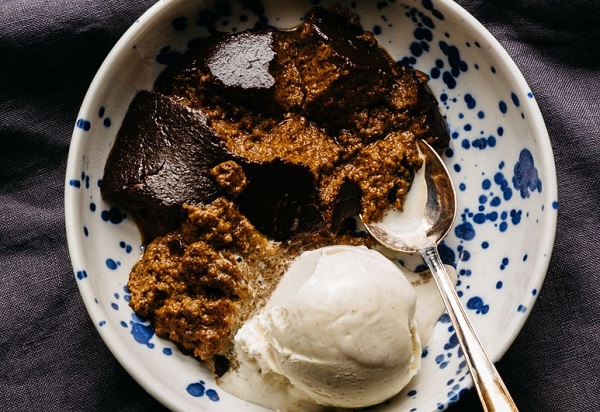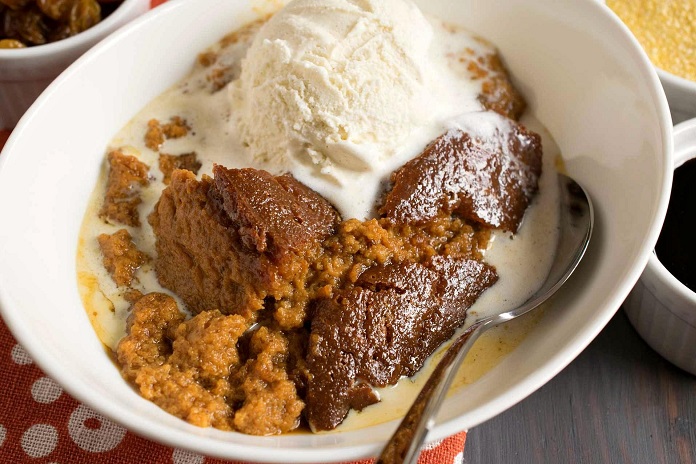On November 13 we celebrated National Indian Pudding Day a a warm, spiced dessert made from cornmeal, molasses, and a blend of spices. It has a rich, slightly sweet flavour and a comforting texture. Often served with a dollop of vanilla ice cream or a splash of cream, have you ever tasted it?
History of National Indian Pudding Day
Also, did you know that Indian pudding is a delightful and traditional dessert with deep roots in American colonial history?
It is a food made by the local Indians of Northern America and the most native dessert we have it has remained mostly unchanged since the time the native Indians used to make it.
In New England, this desert has been around for three centuries now. Did you know that, the name of the pudding may suggest that it refers to the Indians living there, but rather it was named after the cornmeal, known as ‘Indian meal’, calling it Indian Pudding?
Also, in the year 1621, Local food historians have mentioned in their books that back in 1621 when the first Thanksgiving was celebrated by the colonists, this dessert was made part of the main dishes on the menu.
The dessert maintained its centuries-long hold over the pudding category until the 1920s and ’30s when chocolate suddenly arrived in the U.S. Also, the recipes changed because people started shifting towards the sweeter and silkier pudding versions.
This delicious pudding maintained its standard flavour in New England also, where it is still among the favourite puddings of the local people. However, outside this area, comprising six states in the Northeastern United States: Connecticut, Maine, Massachusetts, New Hampshire, Rhode Island, and Vermont, it is largely unknown.
The holiday was never requested in the White House, but somehow this dessert ended up having a day for its name.
Why is it called “Indian” pudding?
The name “Indian” pudding is believed to have originated because cornmeal, a key ingredient, was used by Native Americans long before European settlers arrived. The term “Indian” in the name reflects the use of this indigenous ingredient, although the dish itself has evolved from early colonial American recipes.
| 1621 (Menu Item on the First-Ever Thanksgiving) | The local settlers in America crave the local Indian dessert and so is added to the main menu of the first Thanksgiving dinner. |
| The late 1600s (Present in All the Cookbooks) | In the late 1600s, the dessert is so popular that it is officially there in all the cookbooks. |
| 1700s (Introduction of Molasses) | The settlers in New England find an abundant supply of molasses, which adds a thicker and more flavour dimension to the pudding. |
| 1920s (Indian Pudding Loses its Foothold) | As chocolate and other flavours come pouring into the U.S. and new tastes develop, the pudding is lost to the public. |

Recipe – Classic Indian Pudding
Ingredients:
- 1/2 cup cornmeal
- 2 cups milk (whole milk is best for richness)
- 1/2 cup molasses
- 1/4 cup brown sugar (packed)
- 1/2 teaspoon ground cinnamon
- 1/4 teaspoon ground ginger
- 1/4 teaspoon ground cloves
- 1/4 teaspoon salt
- 1 large egg
- 2 tablespoons unsalted butter
- Optional: 1/4 cup raisins or currants
Instructions:
- Preheat your oven to 300°F (150°C). Grease a 1.5-quart baking dish or a similar-sized ovenproof dish.
- In a medium saucepan, bring 2 cups of milk to a simmer over medium heat. Gradually whisk in the cornmeal, stirring constantly to avoid lumps. Cook for about 2-3 minutes, until the mixture thickens. Remove from heat.
- Stir in the molasses, brown sugar, cinnamon, ginger, cloves, and salt. Mix well.
- Keep the egg in a separate bowl and then stir it into the cornmeal mixture. Add the butter, stirring until melted and fully incorporated.
- If using raisins or currants, fold them into the mixture now.
- Pour the mixture into the prepared baking dish. Bake in the preheated oven for 1 hour to 1 hour 15 minutes, or until the pudding is set and a knife inserted into the centre comes out clean. The pudding should have a slightly custard-like texture.
- Allow the pudding to cool slightly before serving. It’s great served warm, and you can add a scoop of vanilla ice cream or a dollop of whipped cream for extra indulgence.
Conclusion
National Indian Pudding Day is usually celebrated, on November 13. Its rich, comforting flavour which combines the sweetness of molasses with the warm spices of cinnamon, ginger, and cloves makes it a perfect treat for chilly fall and winter days. Indian pudding reflects America’s early colonial culinary practices and the use of ingredients like cornmeal and molasses that were readily available.
It’s known for its unique combination of spices and the deep, robust flavour of molasses, resulting in a rich, satisfying dessert. The texture is a blend of creamy and custard-like, with a consistency that can vary from pudding-like to slightly firm, depending on baking time. It’s versatile and pairs beautifully with v
FAQs
Is it possible to make Indian pudding without eggs?
Yes, you can make a dairy-free version by using an egg substitute like a flaxseed meal mixture or a commercial egg replacer.
Can I add other ingredients to the pudding?
Yes, You can add ingredients like raisins, currants, or chopped nuts to the pudding mixture for extra texture and flavour.
Can I make Indian pudding in a slow cooker?
Yes, you can make it in a slow cooker. Combine the ingredients as directed and pour them into a greased slow cooker and cook on low for 4-6 hours, or until set.
What is Indian pudding?
Indian pudding is a traditional American dessert made with cornmeal, molasses, and spices like cinnamon, ginger, and cloves. It has a rich, custard-like texture and is often served warm with a scoop of vanilla ice cream or whipped cream.
Can I make Indian pudding ahead of time?
Yes, Indian pudding can be made ahead of time. After baking, let it cool completely, cover it, and store it in the refrigerator for up to a week.
Also, read more about National Mincemeat Day – October 26, 2024
